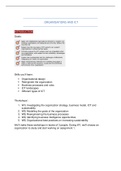ORGANISATIONS AND ICT
INTRODUCTION
Goals:
Skills you’ll learn:
▪ Organizational design
▪ Reengineer the organization
▪ Business processes and rules
▪ ICT landscapes
▪ Different types of ICT
‘Workshops’:
1. W1) Investigating the organization strategy, business model, ICT and
sustainability
2. W2) Modelling the goals of the organization
3. W3) Reengineering the business processes
4. W4) Identifying business intelligence opportunities
5. W5) Organizational best practices on increasing sustainability
We’ll make these workshops in teams of 3 people. During W1, we’ll choose an
organization to study and start working on assignment 1.
,MANAGEMENT INFORMATION SYSTEMS
What are organizations?
An organization is a social entity consisting of people and their relationships. It is
goal-directed, designed as a structured activity system (coordinated activities to
reach the goals) and it’s linked to the external environment (customers, partners, …)
Organizations differ in:
• Size // product vs service // for-profit v non-prft // age // local vs global // sector
Organizations are systems: a regularly interacting group of items forming a unified
whole surrounded and influenced by an environment).
The 2 types of systems
The closed system is kinda the old-day-way.
You can’t study organizations by looking only
at their internal functioning; you should study
the environment as well.
What are typical organizational objectives and challenges?
Strategic business objectives:
➢ ICT helps organizations achieve their goals → there is a growing
interdependence between the ability to use information technology and the
ability to corporate strategies for goal-achievement
Overview of strategic business objectives:
1) Improvement of efficiency to attain higher
profitability → information systems and
technology are an important tool for this
2) ICT-related products and services are the most
relevant now, such as Netflix, self-driving cars,
tikkie-app etc.
3) Information systems can help increase the
customer-supplier-intimacy
4) Collecting and processing information is easier with ICT
5) Online communication is fast and efficient, and helps getting competitive
advantage
6) Making sure that in chaos, your (ICT) service is still there to help the people
7) Customers or investors can force an ICT-service-company to become more
responsible if they want to keep them as customers/investors
,Challenges that organizations face:
Globalization
o Globalization entails opportunities (having divisions all over the world,
gaining intercultural understanding) and threats (divisions from other
countries in your country, needing to understand intercultural
understanding)
Ethics and social responsibility
o Corruption of top management is a problem // many planetary
challenges that organizations need to take their responsibility for by
minimizing their negative impact and maximizing their positive impact)
Responsiveness to changes
o Rapid adjustment to customer demands and market changes (e.g:
information as the main asset and not machines)
The digital workspace
o Choosing the right technology is key for success, old-fashioned
managers can’t keep up with technology)
Diversity
o Organizations should be able to deal with different cultures, working
styles, etc.
What role does ICT play in organizations?
IT = information technology, ICT = information & communication technology
Information systems support the processes of organizations, and not only support but
also transform the processes / way of working. Examples:
❖ Emerging mobile digital platform: if all customers have cellphones and laptops,
the way of working changes and can change if needed, e.g. in a pandemic
❖ Growing business use of big data: organizations need optimal processing
power and analytical capabilities to make the best use of the information that
is being gathered
❖ Growth in cloud computing: many organizations rely on IT facilities outside of
their space
❖ Globalization opportunities: internet reduces costs of operating globally
❖ Increase in foreign trading: it’s easier to outsource globally
❖ New threats: cybersecurity becomes more important
Why has the investment of organizations in ICT increased more than the investment
in physical stuff that is needed? → the price of ICT stuff has been falling
exponentially. Meanwhile, the price of physical stuff has been growing.
, ICT changes fast, and it changes the processes/structure etc. of organizations. Some
of these changes are:
✓ ICT innovations: Cloud computing, big data, use of social networks, etcetra
✓ New business models: Audiovisual enterntainment services (Netflix) instead of
traditional TV, Spotify instead of radio, Airbnb instead of hotels
✓ Expansion of e-commerce: Amazon, AliExpress, Facebook is working on
some e-commerce shit too
✓ Changes in management: mobile now; communication between manager and
employees is mobile, and real-time data is mobile
✓ Changes in firms: less importance to hierarchy and standardization and more
to flexibility, adaptivity and innovation
Example: Transavia offers WhatsApp-based customer support
Perspectives on information systems:
➢ An information system is a set of interrelated components that collect,
process, store and distribute information to support decision making,
coordination and control. It has 3 main-activities:
▪ Input – captures raw data from organization or external environment
▪ Processing – converts raw data into meaningful form
▪ Output – transfers processed information to people or activities that use
it
These are the 3 levels of organizational roles, and Information
systems must support people from each levels.
What is organizational responsibility?
Economy = the production, distribution and consumption of limited goods and
services by different agents. The purpose of economy is satisfying the needs of
people.
Economy has a strong impact in society and nature. Examples:





